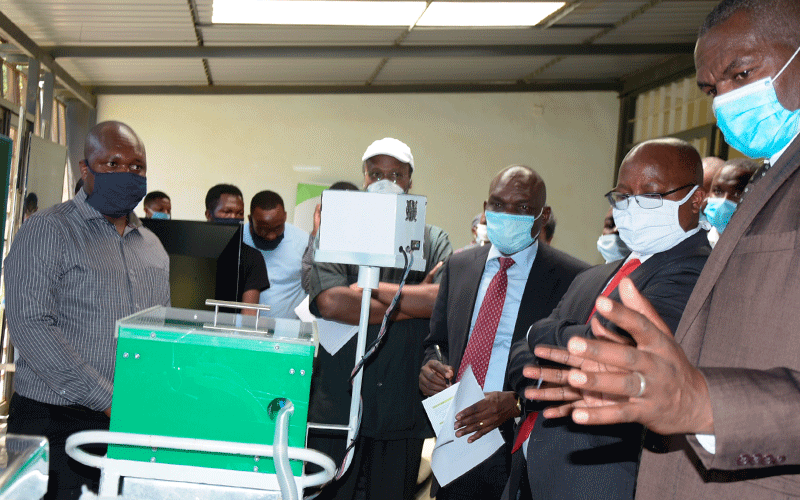Varsity students unveil Coronavirus pandemic solutions

Jomo Kenyatta University of Agriculture and Technology, Kimathi, Kenyatta and Murang’a university students burn the mid-night oil to come up with innovations to help fight pandemic.
University students, researchers and innovators are racing against time to explore solutions to help fight the outbreak.
Many universities and technical institutes have been strategising towards the global challenge, with students burning the mid-night oil to come up with various innovations that can assist the country combat the virus.
Among the higher learning institutions are Jomo Kenyatta University of Agriculture and Technology (Jkuat), Kimathi University, Kenyatta University and Murang’a University.
At Jkuat, students have developed two portable solar-powered ventilators that use a 12-voltage battery, and a contact-tracing application.
They have also unveiled a digital system that predicts Covid-19 infection trends in Kenya, an automatic solar-powered hand-washing machine.
One of the ventilators’ innovators, Karanja Kabini, says the equipment — whose materials are locally available— are reliable and can operate for two weeks without maintenance.
The gadgets are light and portable for use at any point of need. Jkuat’s Engineering Department has the capacity to produce 10 ventilators weekly, which will go a long way to boost shortages in the country. 
“It has a control panel that can vary breathing rates. The operating nurse can increase or reduce the amount of oxygen used by both adults and children,” Kabini said.
Contract tracing app
Students Victor Muthembwa, Boniface Bundi and Crispus Nyaberi from Jkuat have also come up with a ‘Contact Tracing and Case Management App’ which will help to identify who, where and when a person gets into contact with a Covid-19 positive individual.
The app as an important asset in the fight against Covid-19 since it is digital and specifically focuses on tracing contacts who use public transport.
The innovators have already partnered with Super Metro Bus Sacco, which ply the Nairobi-Thika route, as well as Kikuyu and Uthiru areas where the concept is working successfully.
“Instead of the government stopping movements for thousands of people, why not use this app? It is able to identify the exact number of persons who had contact with a Covid-19 positive patient,” Muthembwa said.
“From the data, the Ministry of Health can quarantine and test the virus suspects, reducing time wasted investigating contacts, using vehicles and making numerous telephone calls,” he added.
Pan African University’s Institute for basic Sciences, Technology and Innovation (Pausti), which is housed at Jkuat, has also invented an automated solar-powered hand washing machine meant to help the community around Juja and Kiambu county at large to keep off the scourge.
The prototype encompasses a sensor that perceives human hands from a range of one to 10 centimetres away to trigger a solenoid valve that opens the tap for a 10-second a period, allowing a user to wash hands without having contact with the tap.
The gadget is reduces human interference with the hand-washing machines mounted in public places. It allows for zero-human contact.
Earlier, Kenyatta University had unveiled their own make of a ventilator dubbed Tiba Vent that could save tens of lives of victims of the coronavirus.
The respirators — in short supply in the country—are key equipment for patients who develop difficulty in breathing. The model uses connections of cubical units made of hard silver plastic parts, with pipes connecting to an oxygen tank and two other pipes delivering the air.
Tiba Vent is controlled from a computer where doctors can regulate the concentration of oxygen coming in and out of the patient’s lungs.
Students from different faculties made the prototype in a record one-week and if approved, the institution can make 50 such in a week.
Meanwhile, Brian Ndegwa, a student at Dedan Kimathi University of Technology has developed ‘Rona’, an Artificial Intelligence solution to curb distortion of information and answer questions on the Covid-19 pandemic.
Financial woes
The second year student who developed and actualised the solution in less than a week said he was seeking to get rid of anxiety many people were facing as they were fed with wrong information from the Internet intended to cause fear.
Murang’a University students have also made masks for both adults and children for general purpose and surgical masks to be used by health workers.
“It’s encouraging to hear that the University already has an order to make outfit/gear recommended for use by those medics in direct contact with Covid- 19 patients,” said University Education and Research PS, Simon Nabukwesi.
Despite all these innovations and potential for more in Kenyan universities, most institutions are facing serious financial constraints, frustrating the practical development of the prototypes.
During the unveiling of the innovative gadgets and sanitisers at Jkuat last week, Vice Chancellor Prof Victoria Ngumi said most colleges are struggling with commercialisation of innovations, the main stumbling block being inadequate funding.
“I am pleading to the State and private sector to partner with varsities to formulate relevant policies and offer incentives that propel innovations from the idea stage to fruition and sustainability,” she said.
Speaking at Jkuat when he interacted with various innovations developed by various researchers to curb the virus scourge, Chief Administrative Secretary in charge of Industry, Trade and Enterprise Development, Lawrence Karanja said the government is doing everything possible to protect innovations through formulation of post-Covid-19 policy to source local inventions for use by the citizenry.
The CAS said the government would not allow a single innovation item to go to waste even after the virus ends.







